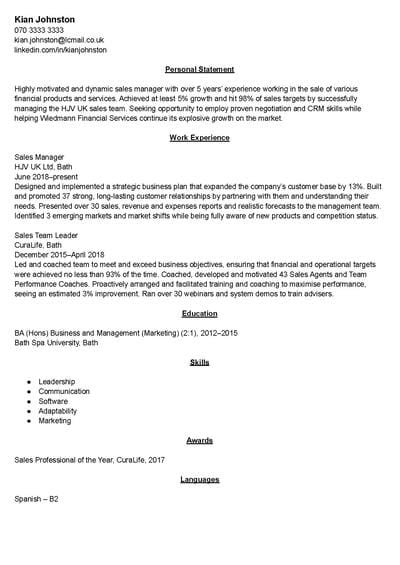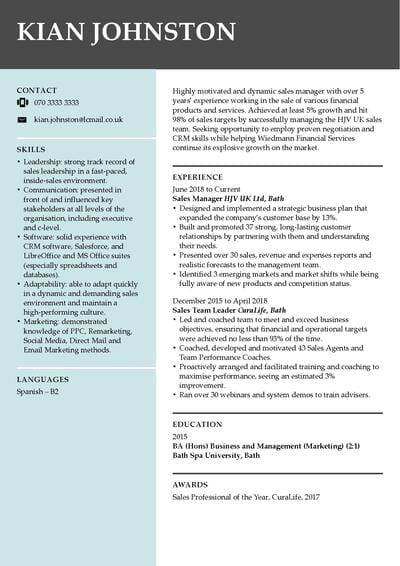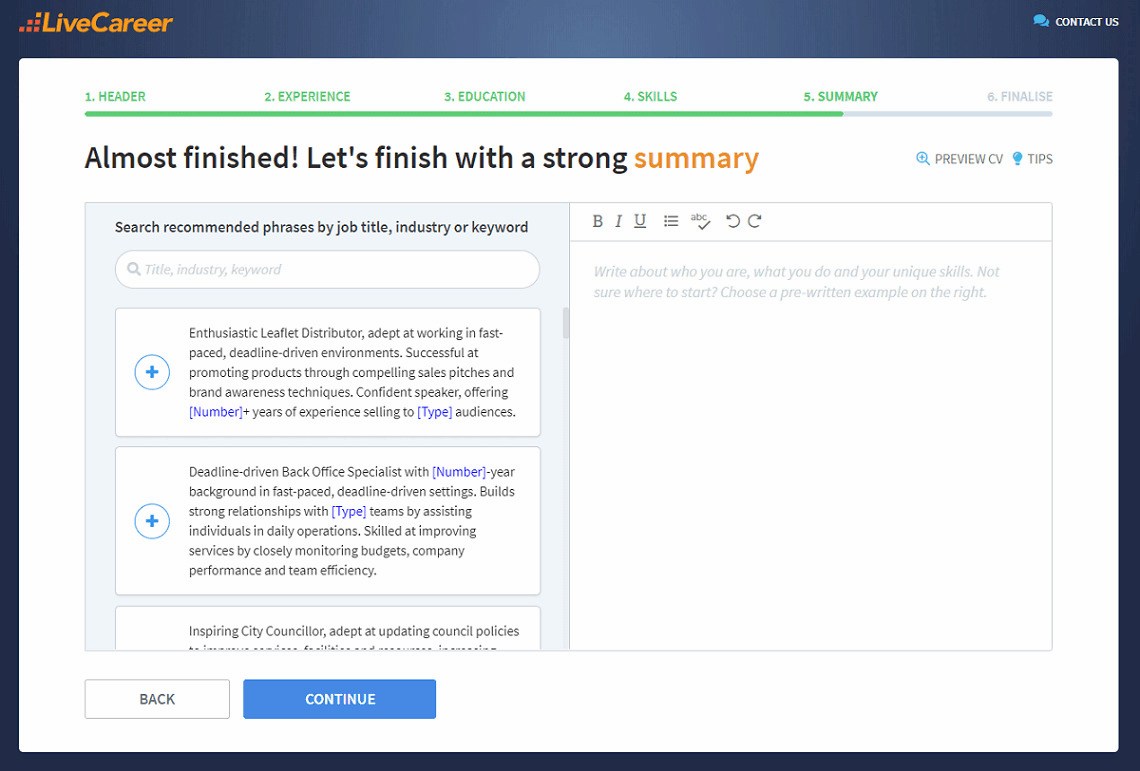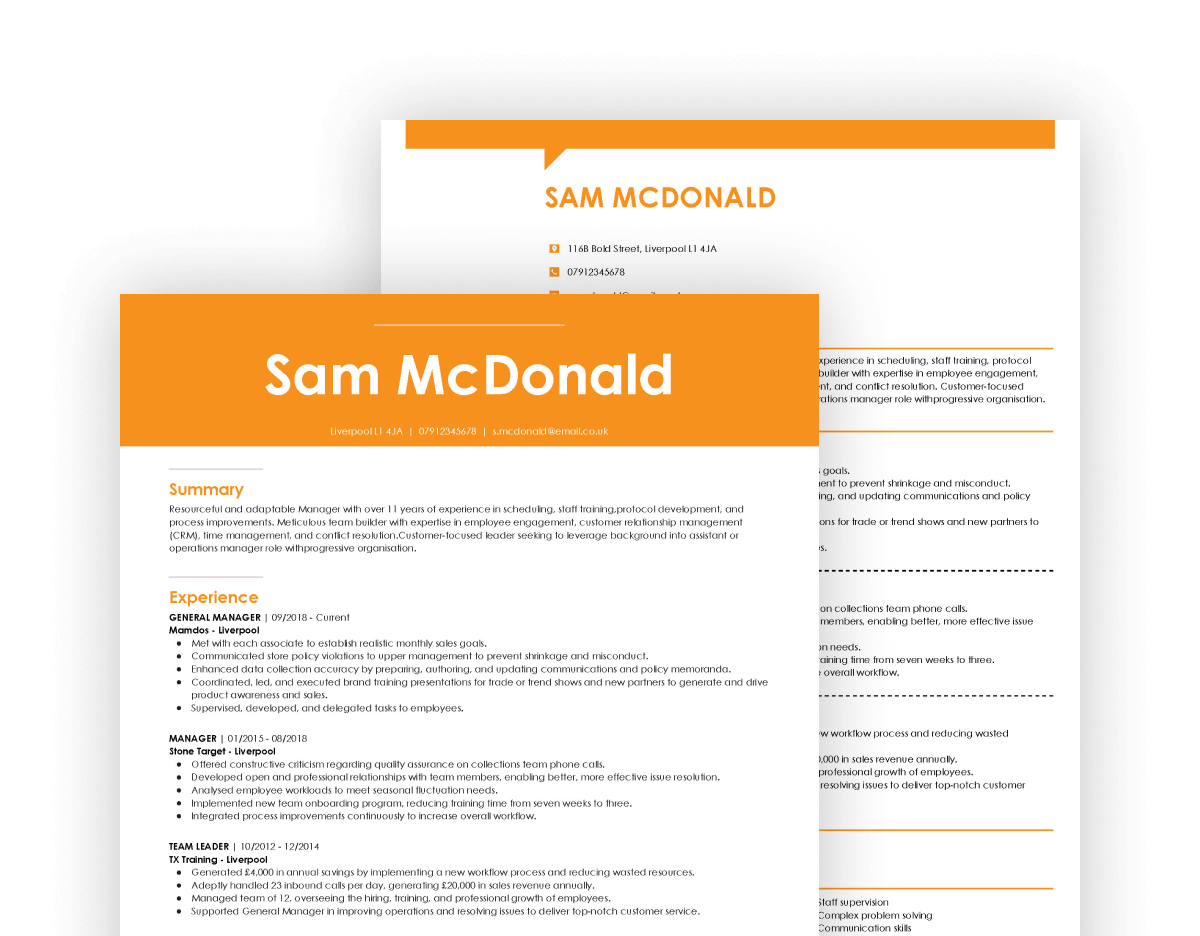Create a professional CV now!
 NO
NO YES
YESOur customers were hired by:
If you’re applying to an academic position or seeking opportunities in competitive industries, the Oxford CV template is an excellent tool for presenting your qualifications in the most polished way possible.
This guide studies the Oxford CV template’s format, along with expert advice and free examples to help you build a professional CV that catches the attention of academic recruiters and institutions.
Create an effective CV in minutes. Choose a professional CV template and fill in every section of your CV in a flash using ready-made content and expert tips.
Create a professional CV now!
 NO
NO YES
YESWe created the sample on the right using our builder. See other good CV examples like this one.
Want to research similar CV examples? Read these guides:
Dr. Jane Elizabeth Smith
123 High Street
Oxford, OX1 2JD
078 7596 8946
jane.smith@email.com
linkedin.com/in/jane-smith
www.janesmithresearch.com
Personal statement
Motivated Doctor of Philosophy in Environmental Studies from the University of Oxford with 4+ years of experience researching sustainable urban development and climate change policy. Published multiple peer-reviewed papers and presented at international conferences on urban resilience, green infrastructure, and policy frameworks. Proven ability to translate complex research into actionable policy insights, driving solutions for climate change mitigation. Seeking to apply expertise in environmental consultancy or climate policy analysis to help global organisations implement sustainable, data-driven strategies.
Education
Doctor of Philosophy (PhD) in Environmental Studies
University of Oxford
October 2020–September 2024
Master of Science (MSc) in Environmental Management
University of Edinburgh
September 2018–July 2020
Bachelor of Science (BSc) in Geography
University of Bristol
September 2015–June 2018
Research interests
Professional experience
Research Assistant
University of Oxford, Department of Environmental Sciences
October 2021–Present
Intern (Environmental Policy)
Department for Environment, Food & Rural Affairs (DEFRA)
June 2019–August 2019
Sustainability Consultant (Freelance)
January 2018–December 2019
Publications
Conferences and presentations
Technical skills
Soft skills
Languages
Awards and scholarships
Extracurricular activities
Volunteer Climate Advocate
Greenpeace UK
October 2017–Present
President
University of Oxford Environmental Society
October 2021–June 2023
An Oxford CV is an academic-focused document that highlights your scholarly achievements, research experience, and academic qualifications. Mostly used for applying to academic jobs, research positions, and other career opportunities, this format highlights your academic strengths and contributions.
Unlike a standard CV for work, the Oxford CV template places far more emphasis on education, research output, and academic involvement, reflecting the high standards and rigorous expectations typical of Oxford University and other leading academic institutions.
The education section is the foundation of your Oxford CV template, outlining your academic qualifications and institutional background. It’s where you include degrees, honours, and any key research projects or dissertations undertaken during your studies.
This section focuses on your involvement in academic research and demonstrates your ability to contribute to your field. It includes research projects, publications, conference presentations, and any awards or fellowships related to your research work.
For candidates applying for academic roles, teaching experience is a necessity. This section details courses taught, any mentoring or teaching assistantships, and highlights your involvement in educational initiatives or curriculum development.
Although the focus of an Oxford CV is on academic achievements, relevant professional experience can also add significant value to your application. This includes positions held that are linked to your research or academic interests, such as work in research institutions or industry partnerships.
The additional information section provides space to highlight other qualifications that strengthen your CV. This could include your key skills, awards, professional memberships, language proficiency, or involvement in relevant academic or community initiatives.
Writing an Oxford CV requires a methodical approach, similar to conducting academic research and selecting the most effective research methods. Research involves careful planning, data collection, and analysis to highlight key findings. Similarly, crafting an Oxford CV will involve organising your academic achievements, research contributions, and relevant experience to showcase your expertise.
The main goal of your Oxford CV is to present your qualifications in a clear, structured way while still adhering to the high academic standards expected by universities and research institutions. Here are the main steps to follow when writing this type of CV:
The formatting of your Oxford CV is crucial, as it needs to be both professional and easy to read. Oxford CV format tends to be detailed, but should never overwhelm the reader with excessive text or redundant information. Your CV should be clear like a well-structured research paper, with legible headings and sections that highlight the most important aspects of your academic and professional life.
Keep these formatting tips in mind when putting together your Oxford CV template:
Remember, a well-formatted CV not only facilitates reading but also reflects your attention to detail and professionalism, which are highly valued in academic and research contexts.
Your CV personal statement is the first thing that potential employers or academic reviewers will read, so it’s vital for setting the tone from the outset. It should concisely summarise who you are, what you have accomplished, and what you aim to achieve in the future. This section should focus on your academic interests, major achievements, and the direction you want your career to take.
When writing a personal statement for your Oxford CV, consider the following:
The education section is the heart of your Oxford CV, where you highlight your academic achievements, including degrees, awards, and significant research. Organise it in reverse chronological order, placing your most recent qualifications at the top.
Start with your degree titles, institutions, and study dates. Include any honours or awards, such as scholarships or fellowships, and provide brief details about your thesis or major projects, emphasising key findings or contributions. Also, mention relevant modules or research topics that align with your academic and career aspirations.
A strong CV summary will convince the recruiter you’re the perfect candidate. Save time and choose a ready-made personal statement written by career experts and adjust it to your needs in the LiveCareer CV builder.

The experience section of your Oxford CV should highlight how your academic and professional roles have shaped your expertise. Include research assistantships, teaching assistantships, internships, and relevant freelance work. List these experiences in reverse chronological order, starting with your most recent position. Be specific about your responsibilities, focusing on research contributions and any leadership roles.
Quantify your impact where possible, such as the number of students mentored or publications contributed to. Highlight collaborative efforts, especially team-based research. For academic roles, it’s important that you mention your use of research methodologies, data analysis, and how you've applied your academic knowledge in real-life situations. This shows how your experience has prepared you for the next move in your career.
A strong Oxford CV not only showcases your academic qualifications but also highlights the skills that set you apart as a candidate. These abilities include both hard skills such as proficiency in software packages or laboratory techniques, and soft skills, like communication or teamwork.
When listing your skills, include specific technical proficiencies that are relevant to your field, such as Python, R, ArcGIS, or any data analysis tools you’ve mastered. If it comes to soft skills, include excellent written and oral communication, time management, problem-solving abilities, and experience collaborating with multidisciplinary teams. These traits will show potential employers or academic committees that you bring more than just academic knowledge to the table.
Technical Skills
Soft Skills
While the core elements—such as personal information, education, professional experience, and skills—are essential, adding tailored sections can boost your CV’s impact. For this purpose, the Oxford CV template offers a flexible and comprehensive framework.
Consider adding these sections that highlight a broader range of your experiences and skills:
Whether you're applying for a research position, teaching role, or academic fellowship, there are a few simple yet effective ways to strengthen your Oxford CV:
And, that’s it. You’re ready to send your application with confidence!
You don’t have to be a CV writing expert. In the LiveCareer CV builder you’ll find ready-made content for every industry and position, which you can then add with a single click.

Thanks for reading. Do you have any tips regarding the Oxford CV template you’d like to share? Is there anything you’d like me to explain in more detail? If you’ve got any questions about the Oxford CV, please use the comments section below. I’m looking forward to hearing from you.
Our editorial team has reviewed this article for compliance with Livecareer’s editorial guidelines. It’s to ensure that our expert advice and recommendations are consistent across all our career guides and align with current CV and cover letter writing standards and trends. We’re trusted by over 10 million job seekers, supporting them on their way to finding their dream job. Each article is preceded by research and scrutiny to ensure our content responds to current market trends and demand.
About the author
Since 2013, the LiveCareer UK team has shared the best advice to help you advance your career. Experts from our UK editorial team have written more than one hundred guides on how to write the perfect CV or cover letter.
Rate this article:
Oxford cv
Average:


Discover top strategies on how to get a job, whether you're a career switcher or a first-timer. Make your job search a breeze with our complete guide & tips.

How to find a job in London and get to the lively streets of this vibrant city? See how to win a job in 7 steps and learn tips to boost your employability.

See the top 50 highest-paying jobs in the UK for 2025 across different industries. Explore salary ranges, job descriptions, and expectations.
Our customers were hired by:
